by John Copley
(ANNews) – On Monday, October 24 former Truth and Reconciliation (TRC) Commissioner Dr. Wilton (Willie) J. Littlechild and TRC Education leader Charlene Bearhead met with the public at the Southpointe Community Centre to discuss topics and strategies that centred around the past, present and future plans for reconciliation in Canada.
The three-hour session, which included a question and answer period, was presented by the River Community Church and emceed by Harold Roscher, the director and chaplain of the Edmonton Native Healing Centre. The goal, explained Roscher, was to present an opportunity for the community “to journey alongside the urban Aboriginal population” with the intention of aiding in the task of “reconnecting people to culture and ceremony.”
About 300 members of the community attended the event and their reaction to the comments from the podium made it clear that they not only have an appreciation of the issues, but that they also want to help ensure that the healing process for survivors continues in earnest as the Government of Canada works towards fulfilling the mandate of the TRC and its numerous Calls to Action.
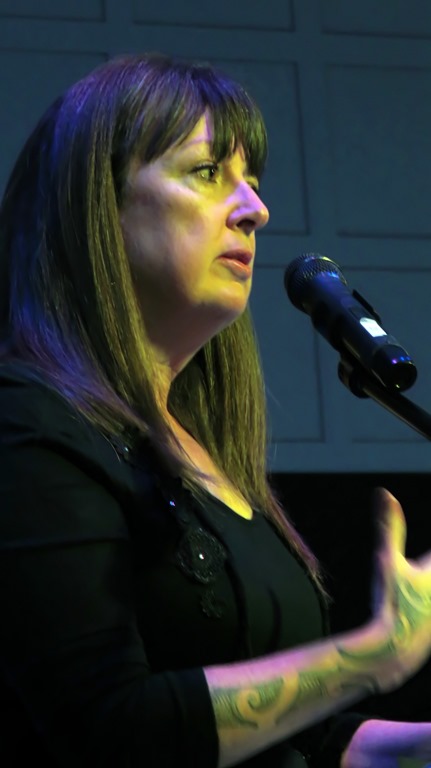
Charlene Bearhead spoke to the audience about residential school trauma and the healing process.
“As a member of Treaty 6,” noted Bearhead early in her comments, “it’s nice to be home and to have this opportunity to speak to you tonight. It’s important to point out that most of the talk we hear about when it comes to the final days of the TRC’s six-year mandate is about the 94 recommendations that the three-person commission included in their final report.”
The term ‘recommendations,’ she pointed out is somewhat misleading because recommendations “are not binding” and the 94 directives outlined by the TRC are not recommendations, but instead “Calls to Action.”
Charlene Bearhead works with the University of Manitoba as the Education Lead for the Truth and Reconciliation Commission. She is currently spearheading a campaign designed to not only educate the Canadian public about the consequences of nearly two centuries of Indian Residential Schools, but also to incorporate that knowledge into the education system. The intent is for all citizens, today and tomorrow, to have a better understanding of why Indigenous peoples are having a difficult time keeping up with mainstream society when it comes to education, employment and social equality.
“Reconciliation,” she noted, “is a broad term that introduces many questions. What is it? How does it work? Can we make it work? The answer is that reconciliation is different for each one of us – for me it’s education.”
But, she noted, you don’t need to be an expert and you don’t need to be a teacher with specific qualifications.
“We are all teachers in our own way,” she explained. “As fathers, mothers, aunts, uncles, grandparents – we teach our children.”
Addressing the 94 Calls to Action doesn’t require knowledge or training in cultural protocol, she noted, it “simply requires learning the facts and teaching the facts, telling the truth and by being both understanding and kind to one another.”
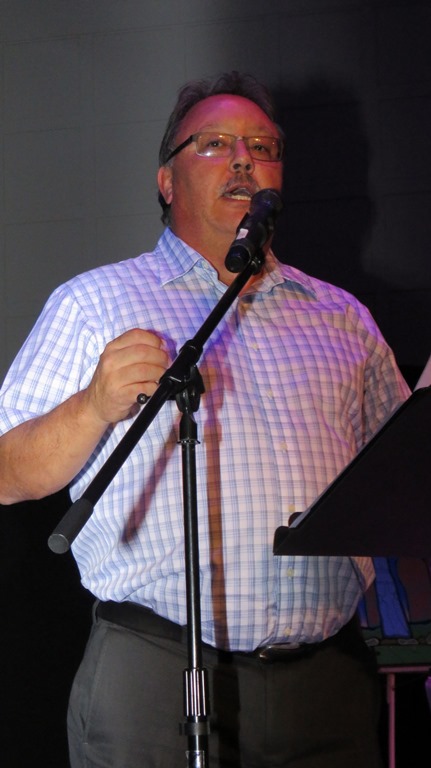
Harold Roscher, the director and chaplain of the Edmonton Native Healing Centre opened the meeting and introduced the guest speakers.
Bearhead called on the audience to learn more about TRC and what it is doing to help bridge the gap between societal issues and Indigenous issues. She said that “if we can all be honest, open our hearts and our souls, and acknowledge that we are all different, then we as individuals can decide what we can do next.”
Change, she noted, can begin in our homes and in our schools and by utilizing “visual demonstration” with simple things, day-to-day acts of recognition and awareness. For instance, “we are on Treaty 6 land and by talking about it, by choosing to show the flags of our nations, by acknowledging the people” who have been here for a millennium, “we can all effect positive change. If we know better, we can do better.”
Bearhead encouraged the audience to check out the National Centre for Truth and Reconciliation (NCTR) on the University of Manitoba’s website (umanitoba.ca), “where you can watch video presentations and listen to young people discussing what they believe Canada’s future should look like.”
There you will learn that the NCTR, established in 2015, isn’t just a temporary initiative, but one that is meant to last forever. The Centre, you will learn, “was created to preserve the memory of Canada’s Residential School system and legacy, and will include the permanent statements, documents, and other materials gathered during the six year mission the TRC completed last year.
The mandate of the NCTR will ensure that: survivors and their families have access to their own history; that educators can share the Residential School history with new generations of students; that researchers can delve more deeply into the Residential School experience; that the public can access historical records and other materials to help foster reconciliation and healing and that the history and legacy of the Residential School system are never forgotten.
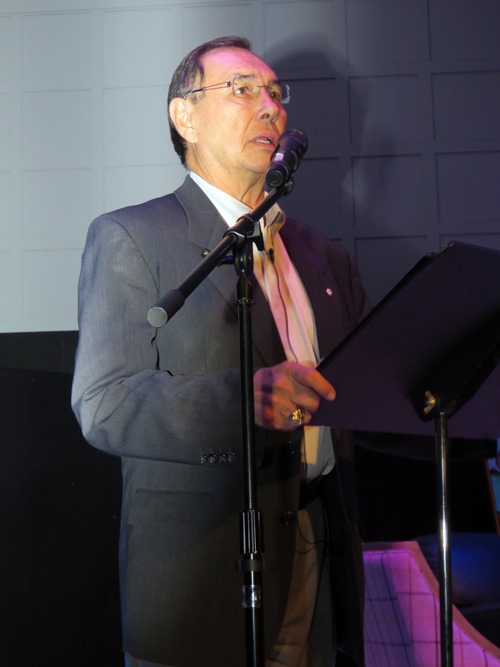
Dr. Wilton (Willie) Littlechild spoke to the audience about his experiences as a Commissioner with the Truth and Reconciliation Commission.
Like Charlene Bearhead, Dr. Wilton Littlechild is a fluent and intelligent speaker who addressed the audience with facts and figures and statistics that bear witness to the atrocities suffered by Indigenous peoples of Canada during the residential school era. His goal wasn’t to lay blame, suggest guilt or present the frightening facts of those archaic days of yesteryear, but instead it was to open the eyes of those in attendance so they would have a better understanding of the cause and effect that the residential schools have had on Indigenous peoples. His goal was to inform and educate the audience and give them a better idea of what they, as individuals and as a collective, can do to help their communities and eventually the entire country, bring reconciliation and healing full circle.
As a residential school survivor, Dr. Littlechild’s awareness of reconciliation issues is inherent; as a learned scholar and a practicing attorney his knowledge of the facts is unmatched by those who have not walked in his shoes. He addressed the audience not only as an educated speaker but also as a survivor who understands the importance of healing, who realizes that the stereotyping and marginalization that Indigenous peoples have been subjected to since colonization must come to an end if Canada is ever to truly realize how great it can really become.
He talked about the silence that has helped perpetrate the conception that many Canadians have when it comes to the country’s Aboriginal populations, noting that for far too long no one knew or understood what was happening to Canada’s First Citizens because there was an ongoing push to ‘settle out of court.’
“When you settle out of court,” he noted, “no one learns anything about you.”
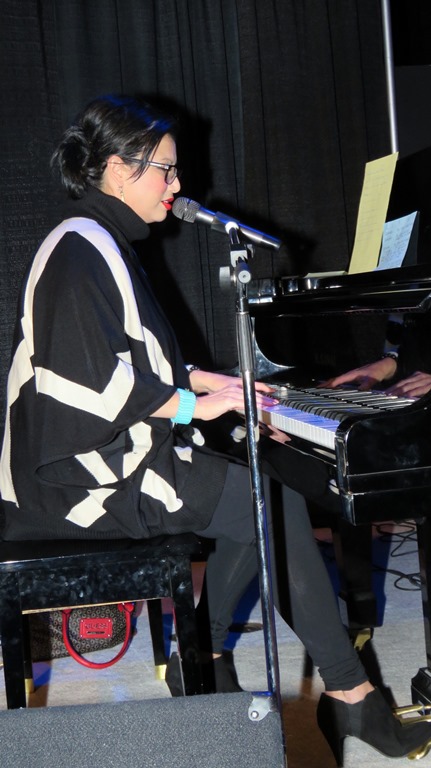
Michelle Neviadomy entertained the 300 people in attendance with songs performed on the drum and piano.
The former commissioner spoke to the audience about how and why children were removed from their homes and families and how a parent would be jailed if they tried to protect their children. He talked about the missed opportunities that parents had to raise their children and the consequences of those children growing into adults without the knowledge of how to raise a child or even become a member of a family or community. He spoke about physical, sexual, emotional and mental trauma that many children faced in the schools and about the loss of their spiritual and cultural connections to their own communities. He spoke about the loss of identity and the inevitable punishments children faced if they even spoke a word of their own language in the schools. He spoke about the parents who’d lost their children to church and government officials, and emphasized what that loss can mean to a mother and father and the community as a whole.
“They went from being a vibrant and healthy family to endless days of nothingness.”
As former students returned to their communities or to the streets of the city they turned to alcohol because they’d lost all hope and needed something to help them get over the fact that the mission of both government and church was to ‘kill the Indian in the child.’
“Learning more about what happened in those schools, schools that didn’t finish closing down until 1996, is very important” he said, “but even more important is asking ourselves: what can we do to get to the reconciliation stage?”
Dr. Littlechild also spoke about the difficulty the Commission had when talking to people about their experiences because “we were asking people to talk about things they are trying to forget.”
The Commission visited more than 300 communities during Dr. Littlechild’s six-year term as a TRC Commissioner. He noted that about one third would not talk about their experiences while about two-thirds said they would try, to help bring “closure” to some of their personal demons.
Some of the residential school students, he noted, were told that they were the devil’s children; some were told that they were less than human. Others were told that would never see their mothers again and “many didn’t know what love is and said they’d never experienced it. I remember that it was at our first gathering in Halifax that we began by saying: I love you; we love you.”
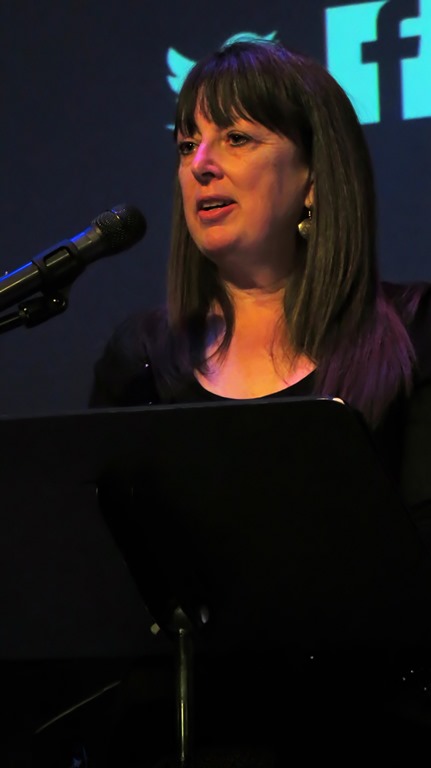
Charlene Bearhead
During his talk Dr. Littlechild also spoke about the United Nations Declaration on the Rights of Indigenous Peoples, and the establishment of the 10 Principles of Reconciliation that need to be followed if reconciliation is to become a viable tool that will enable the healing process to be effective. He addressed the themes of the seven National Events held by the TRC noting “that in Winnipeg it was Respect; in Inuvik, it was Courage; in Halifax, it was Love; in Saskatoon, it was Truth; in Montreal, it was Humility; in Vancouver, it was Honesty and in Edmonton it was Wisdom.”
The last two of the 10 Principles of Reconciliation are among the most important when it comes to helping the Canadian community understand the role that their participation will play in the reconciliation process.
“Reconciliation requires political will, joint leadership, trust building, accountability, transparency and investment of resources,” and it requires “sustained public education, dialogue and youth engagement about the history and legacy of residential schools, treaties and Aboriginal rights and past and present contributions of Indigenous peoples to Canadian society.”
Education it was noted throughout the meeting, will be the prime mover when it comes to including Canadian citizens as an integral part in the reconciliation process. Together, Charlene Bearhead and Wilton Littlechild painted a picture that everyone at the meeting seemed to understand. After a rousing standing ovation, the two speakers fielded numerous questions from the audience. The evening concluded with a nod and a smile from the moderators and a comment that declared: “this was a very good meeting.”

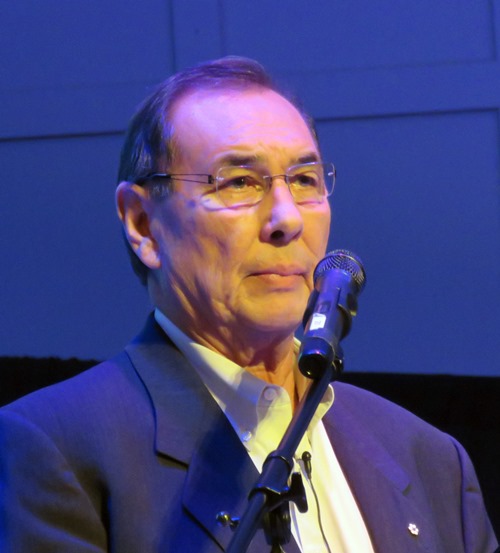

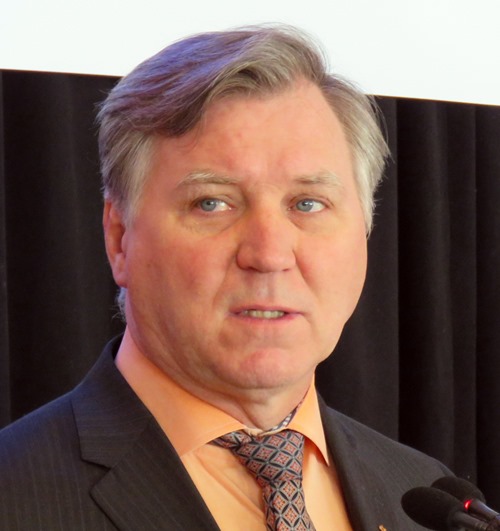
Be the first to comment on "Road to reconciliation must be journeyed in homes and schools"